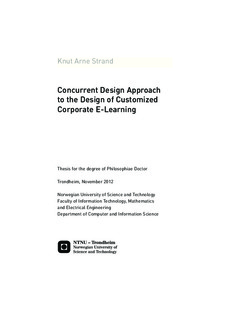| dc.contributor.author | Strand, Knut Arne | nb_NO |
| dc.date.accessioned | 2014-12-19T13:39:21Z | |
| dc.date.available | 2014-12-19T13:39:21Z | |
| dc.date.created | 2012-12-19 | nb_NO |
| dc.date.issued | 2012 | nb_NO |
| dc.identifier | 579402 | nb_NO |
| dc.identifier.isbn | 978-82-471-3692-8 (printed ver.) | nb_NO |
| dc.identifier.isbn | 978-82-471-3693-5 (electronic ver.) | nb_NO |
| dc.identifier.uri | http://hdl.handle.net/11250/253076 | |
| dc.description.abstract | Background: In today's knowledge-based economy corporations have an increasing need for employees with appropriate competencies, and customized e-learning can be a means to cover some of this need. Higher education institutions (HEIs) can take part in this market by offering e-learning-based training and education customized to the needs of the corporate clients. There is, however, a variety of needs that should be taken into account to form sustainable e-learning courses and related training services for the students, and this implies that it is challenging to design e-learning deliverables customized for corporate clients. To succeed in developing holistic e-learning designs which cover most relevant requirements, participants representing different roles such as customer representatives, domain experts, pedagogues, technical experts, economists and market people, students, and people from the administration should be present in the design phase. Furthermore, these stakeholders should utilize modern computersupported cooperation, while they strive to produce high quality results in a time and cost effective manner. Concurrent design is an approach used to solve complex and interdisciplinary design issues in which interactions between different disciplines is essential to achieve optimal and comprehensive solution. This thesis considers the use of a concurrent design approach, when customized e-learning deliverables are designed and developed for corporate clients. It is a paper-based thesis which includes six scientific and peer-reviewed papers, besides four secondary papers that are not included in their entirety but only where general information is described.
Aim: The overall research aim was to contribute with basic motivation, implementation experience, and requirements for practical realization, regarding methodological approaches for concurrent design of e-learning deliverables for corporate clients. The following research questions were answered:
1. Why should HEIs apply a concurrent design approach when they aim to deliver e-learning to corporate clients?
2. How should a concurrent design approach for the development of customized e-learning for corporate clients be materialized? That is to say, how should this approach initially be described, and how should it eventually be tested and evaluated?
3. What are the key requirements for a concurrent design approach to the design of customized e-learning for corporate clients?
Methods: This study was inspired by design-based research, and various research methods that were suitable to answer the research questions faced as the project progressed, were utilized. This includes literature reviews, questionnaires, interviews, design science, action research, besides qualitative data analysis and coding of collected data.
Contributions: The main contribution of this thesis is the concurrent design inspired methodological approach to the design of new e-learning solutions for corporate clients, which are customized to the current context and the project in question. The following contributions were identified:
1. Detected motivation and conditions for applying a concurrent design approach to the design of customized e-learning for corporate clients.
2. The concurrent e-learning design method; which includes a description of processes, roles, models, tools, a concurrent design facility, and an appropriate infrastructure.
3. Experience from using action research as a means of introducing new artifacts at higher education institutions.
4. Requirements and guidelines for concurrent design of customized corporate e-learning; which includes 16 principles of concurrent e-learning design and some additional prescriptive approaches that should be considered for distributed workspaces.
Conclusions: It is the e-learning design processes and the corporate use of e-learning provided by higher education institutions, that forms the basis for this doctoral project. In this context, a concurrent design approach to the design of customized corporate e-learning is materialized. To a large extent this also concerns computer-supported cooperative work on a more general level. This thesis is thus a contribution in instructional design, which also provides experience regarding how technological solutions should be used and what requirements shall apply to solutions that support computer-supported cooperation in interdisciplinary design processes. | nb_NO |
| dc.language | eng | nb_NO |
| dc.publisher | Norges teknisk-naturvitenskapelige universitet, Fakultet for informasjonsteknologi, matematikk og elektroteknikk, Institutt for datateknikk og informasjonsvitenskap | nb_NO |
| dc.relation.ispartofseries | Doktoravhandlinger ved NTNU, 1503-8181; 2012:198 | nb_NO |
| dc.relation.haspart | Strand, Knut Arne; Staupe, Arvid. To Provide Online Distance Learning as a Portfolio of Services. Proceedings of World Conference on Educational Multimedia, Hypermedia and Telecommunications: 4433-4442, 2009. | nb_NO |
| dc.relation.haspart | Strand, Knut Arne; Hjeltnes, Tor Atle. Design of Customized Corporate E-Learning. Seminar.net - Media, technology and lifelong learning. (ISSN 1504-4831). 5(2), 2009. | nb_NO |
| dc.relation.haspart | Strand, Knut Arne; Staupe, Arvid. The Concurrent E-Learning Design Method. Proceedings of Global Learn Asia Pacific 2010 (pp. 4067-4076). AACE.: 4067-4076, 2010. | nb_NO |
| dc.relation.haspart | Strand, Knut Arne; Staupe, Arvid. Action Research Based Instructional Design Improvements. Proceeding from Norsk konferanse for organisasjoners bruk av informasjonsteknologi, 2010: 25-38, 2010. | nb_NO |
| dc.relation.haspart | Strand, Knut Arne; Staupe, Arvid; Maribu, Geir Magne. Prescriptive Approaches for Distributed Cooperation. Proceedings of World Conference on Educational Multimedia, Hypermedia and Telecommunications: 1011-1020, 2012. | nb_NO |
| dc.relation.haspart | Strand, Knut Arne; Staupe, Arvid; Hjeltnes, Tor Atle. Principles of Concurrent E-Learning Design. Enterprise Resource Planning Models for the Education Sector - Applications and Methodologies: 48-75, 2013. | nb_NO |
| dc.title | Concurrent Design Approach to the Design of Customized Corporate E-Learning | nb_NO |
| dc.type | Doctoral thesis | nb_NO |
| dc.contributor.department | Norges teknisk-naturvitenskapelige universitet, Fakultet for informasjonsteknologi, matematikk og elektroteknikk, Institutt for datateknikk og informasjonsvitenskap | nb_NO |
| dc.description.degree | PhD i informasjonsteknologi | nb_NO |
| dc.description.degree | PhD in Information Technology | en_GB |
